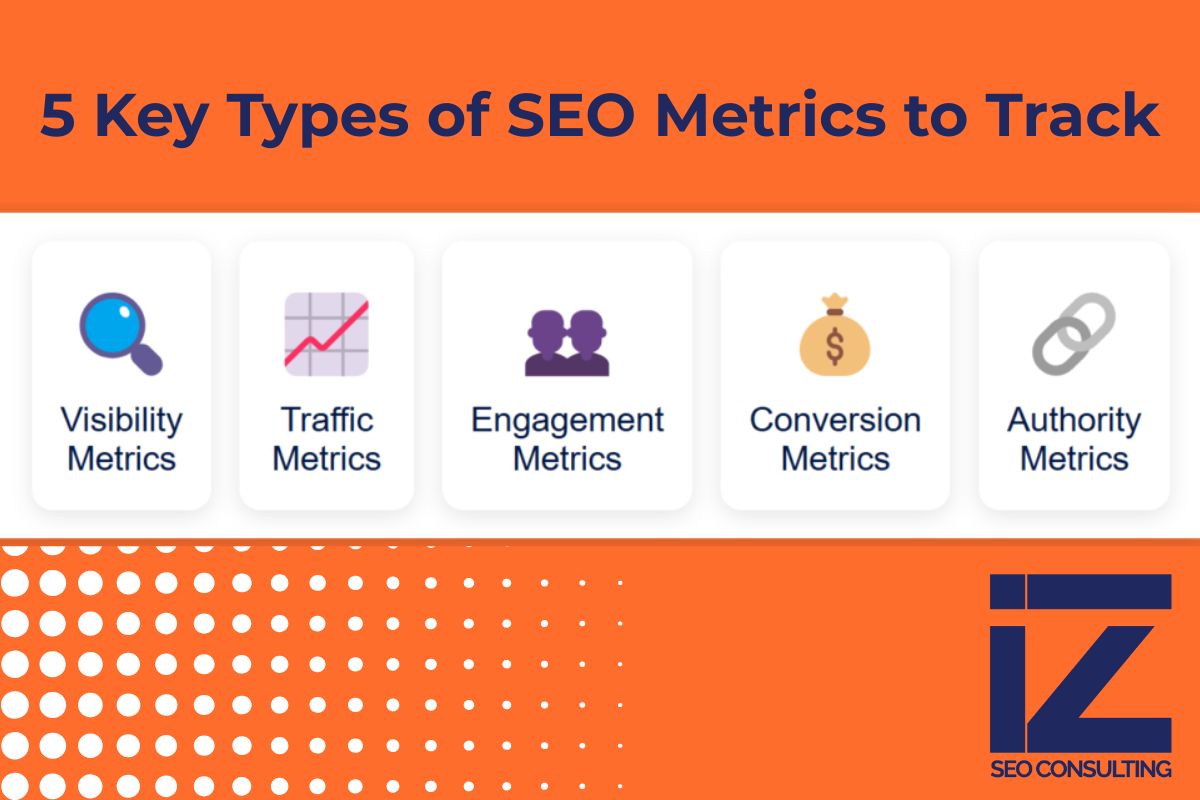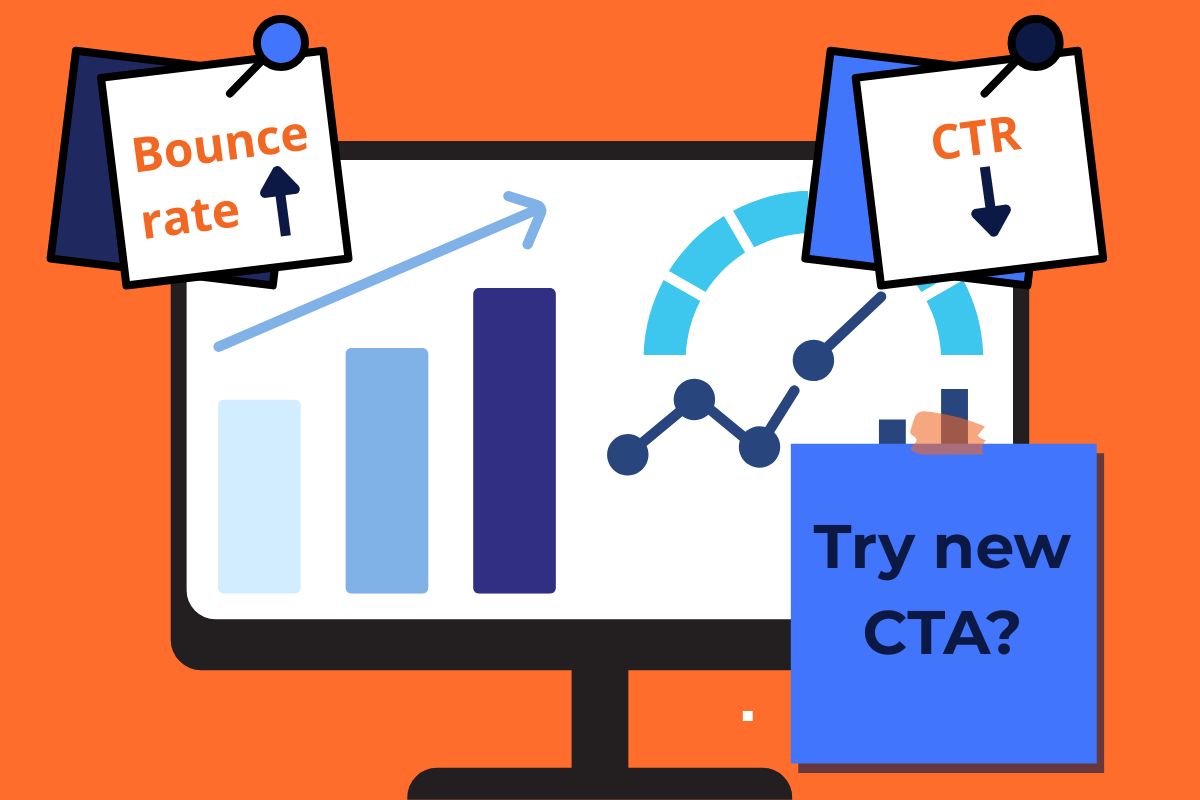If you’re investing time and money into your website, you want to know it’s paying off. That’s where SEO metrics come in. They’re the pulse of your online performance, telling you what’s working, what needs help, and how to get more traffic that actually converts.
But what are SEO metrics, exactly? In short, they’re measurable data points that reveal how well your site is performing in search engines and how visitors engage with your content. Tracking the right SEO KPIs helps you see the big picture and fine-tune your strategy for growth.
In this guide, we’ll cover the most important SEO metrics to watch, how to interpret them, and how to turn numbers into action that improves rankings and drives results.
5 Key Types of SEO Metrics to Track
To build a strong, data-driven SEO strategy, focus on these five core areas. Each shines a light on a different part of your website’s performance.

1. Visibility Metrics
Visibility metrics show how often your content appears in search results, which is crucial for understanding your exposure.
- Impressions: How many times do your pages appear in search results? You’ll find this in Google Search Console under Performance.
- Keyword rankings: Where your pages rank for target keywords. Tools like Ahrefs or SEMrush help you monitor changes over time.
These metrics are your early warning system. If your impressions or rankings drop, it could signal growing competition or technical issues.
2. Traffic Metrics
Traffic metrics reveal how people arrive at your site. The main one is:
- Organic traffic: Visitors who land on your site from unpaid search results.
- Click-through rate (CTR): The percentage of people who click your link after seeing it in a search. Low CTR? Your titles or meta descriptions might need work.
Google Analytics and Search Console are your go-to tools here.
3. Engagement Metrics
These SEO metrics to track show how visitors interact with your content.
- Bounce rate: The percentage of visitors who leave after viewing just one page.
- Dwell time: How long do visitors stick around before heading back to search results?
- Pages per session: How many pages do they view before exiting?
If your bounce rate is high or your dwell time is low, your content might not be meeting search intent, or your site might load too slowly.
4. Conversion Metrics
Traffic is great, but conversions are the ultimate goal. Conversion metrics include:
- Conversion rate: The percentage of visitors who complete a desired action (buy, sign up, download).
- Goal completions: Set up in Google Analytics to track things like form fills or newsletter sign-ups.
When organic traffic rises but conversions stall, revisit your landing pages and make sure you’re targeting the right keywords.
5. Site Authority Metrics
These show how trustworthy and influential your site is, which impacts rankings.
- Backlinks: Inbound links from other sites signal authority. Use Ahrefs, SEMrush, or Moz to track your link profile.
- Domain Authority (DA): Moz’s metric that predicts how well your site will rank. It’s not used by Google directly, but it’s a useful competitive benchmark.
By consistently tracking these important KPIs to consider for SEO, you can spot trends, fix weak spots, and double down on what’s working.
Technical, Local, and Enterprise SEO KPIs
Not all metrics are one-size-fits-all. Depending on your business, you’ll also want to monitor specialized KPIs.

Technical SEO KPIs
If your site has complex architecture or thousands of pages, technical SEO KPIs are critical:
- Page load speed
- Crawl errors
- Mobile usability
Fixing these issues helps ensure search engines can properly index your content and users don’t abandon slow pages.
Metrics for Local SEO
If you’re targeting a specific city or region, keep tabs on these metrics for local SEO:
- Local keyword rankings
- Google Business Profile interactions
- Customer reviews & ratings
Local visibility drives foot traffic and phone calls, so optimizing here means more nearby customers finding you.
Enterprise SEO Metrics
Large sites with multiple subdomains, product lines, or locations rely on enterprise SEO metrics like:
- Number of indexed pages
- Branded vs non-branded traffic
- Link growth across massive content portfolios
Tracking these ensures consistent performance across your entire online presence.
Content Quality: The Hidden Power Metric
It’s easy to get wrapped up in technical dashboards, but content quality is the heart of SEO. Strong content naturally improves SEO metrics like dwell time, backlinks, and even rankings.
Check:
- Readability: Is it clear and skimmable?
- Topical depth: Does it thoroughly answer user questions?
- Visuals & examples: These keep people engaged longer.
Truly useful content underpins all proven SEO strategies, driving organic growth that lasts.
How to Interpret SEO Metrics and Act on Them
Tracking metrics is only half the battle. To turn data into growth:
- Set benchmarks. Know your current numbers so you can measure improvement.
- Look for patterns. Is high traffic paired with high bounce rates? That’s a content or UX issue.
- Adjust and retest. Try new calls to action, improve page speed, or target better-matching keywords.

Think of your data as clues — it’s your job to investigate and refine.
Common Mistakes When Measuring SEO KPIs
Even experienced marketers slip up. Watch out for these pitfalls:
🚩 Focusing on vanity metrics: A spike in impressions means little if no one clicks.
🚩 Not segmenting data: Always look by device, location, or channel for sharper insights.
🚩 Neglecting content quality: Thin content can rank temporarily, but it won’t build long-term authority or engagement.
FAQs About SEO Metrics
How can I track SEO metrics for free?
Google Analytics and Search Console give you a ton of data on organic traffic, CTR, bounce rates, and more — at zero cost.
How often should I check my metrics?
Weekly or monthly is typical. Some issues, like crawl error,s can wait, unless you suspect technical problems.
Why is my organic traffic not converting?
It could be wrong keywords, poor landing pages, or mismatched intent. Start by reviewing your pages with low conversion rates.
How do I track backlinks?
Tools like Ahrefs, Moz, or SEMrush let you see new and lost backlinks, plus the authority of sites linking to you.
What’s the key value proposition of Google Search Campaigns?
The key value proposition of Google Search Campaigns gives you fast, direct visibility, while organic SEO builds a longer-term foundation.
Start Tracking, Start Growing
Tracking SEO metrics isn’t optional — it’s the backbone of making smart decisions. Start simple: pick a few SEO metrics to track, build from there, and watch how data transforms your strategy.
And if you want expert guidance, the team at Indexed Zone SEO is here to help. We specialize in turning complex data into growth plans that work — whether you’re a local shop, a national brand, or managing a massive enterprise site.



